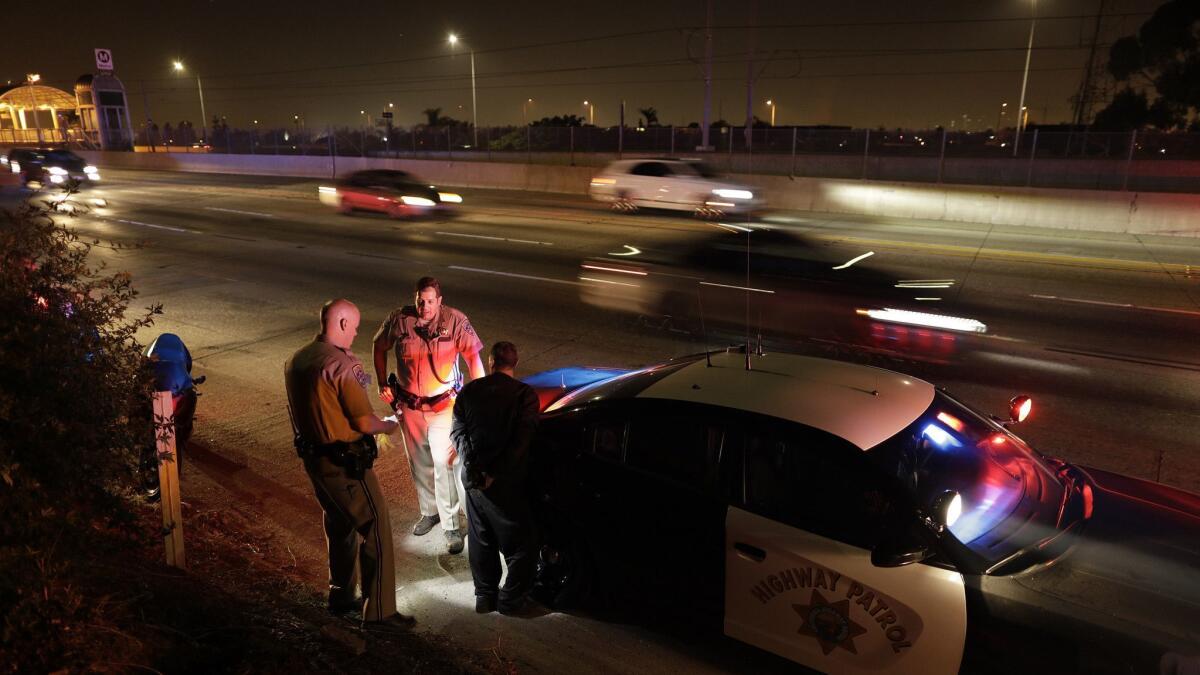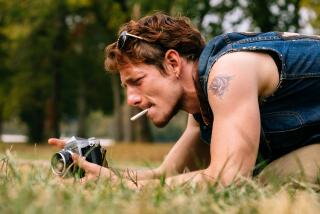Op-Ed: Why I no longer warn my fellow motorcyclists about nearby police

- Share via
Motorcyclists tend to be iconoclasts and rebels, loners who travel in packs and stick to their own kind. Adventure riders hang out with adventure riders, sport riders with sport riders, and Harley owners with other Harley owners.
But on one thing we are unified: No matter the bike, no matter the brand, we always signal to warn each other about cops. Riding on the Angeles Crest Highway, or Mulholland Drive or other favorite biker haunts, when we see Los Angeles Police Department or California Highway Patrol officers lurking, we alert oncoming riders by raising one hand above our heads and tapping our helmets.
Well, I’m not doing it anymore.
Just over 5,100 motorcyclists died on U.S. roads in 2017, the last year for which complete numbers are available, according to the Insurance Institute for Highway Safety. Motorcycle deaths now account for 14% of all motor vehicle deaths, a percentage that has doubled since 1997, and motorcyclists are 28 times more likely to die while riding than drivers or passengers in cars, IIHS numbers show. A lot of those deaths were in California. According to the Governors Highway Safety Assn., we have the highest number of registered motorcycles of any state in the country, and year after year we lead the nation in motorcycle fatalities.
I’d much rather have those riders get a speeding ticket or two, and stay alive.
About 40% of those deaths occurred in single-vehicle incidents, when riders hit a stationary object – a tree, a guard rail, a parked car or the pavement -- and more than a third of all motorcycle deaths involved speeding.
I’ve been riding California roads for more than 45 years, and I understand why people speed. Riding a motorcycle properly feels like flying, and higher speeds can increase this sensation. You feel deliciously liberated from gravity. Riding fast also cranks up the thrill level and offers you a way to test your skills.
Most of today’s bestselling bikes accelerate very quickly and can run at extremely high speeds. Riders usually run out of talent long before they run out of horsepower. In a very common Angeles Crest scenario, a rider is moving too fast to complete a turn, runs wide, and hits something – a barricade, if he’s lucky, or a parked car or a tree or a rock if he’s not.
Those who rip up the Snake in Malibu or race each other up the Crest see these accidents all the time. In the last year alone I’ve been an eyewitness to three such accidents. One of the victims would almost certainly have died had we not come upon the accident when we did, seconds after it happened, and summoned help.
Many of my riding buddies have had terrible accidents themselves. Despite that, no one I know has ever talked about slowing down for his own safety. The only reason motorcyclists slow down, in my experience, is because they’re afraid of getting a speeding ticket.
The CHP responds to multiple serious crashes every weekend on these roads. The injuries and deaths appear to do nothing to reduce the number of riders or the speed at which they travel.
A speeding ticket does. I know plenty of bikers who ride more slowly than they’d like to because they are maxed out on tickets. They’ve paid their fines, watched their insurance rates rise, and gone to traffic school to get a ticket dismissed so many times that they aren’t allowed to do that anymore.
It can get expensive. When an officer cites a rider for speeding, he might also notice the rider has an expired license, or no motorcycle endorsement or insurance, or write the bike up for expired tags, loud pipes, illegally customized turn signals or license plate brackets or any one of dozens of smaller infractions – all of which cost money to resolve. Years ago I got written up on a vintage Triumph and walked away with a pamphlet-length series of citations.
Those who haven’t been caught will slow down when warned. As soon as we see that tap on the helmet, we cut the throttle and watch for Johnny Law around the next corner. When we’re well past him, we get back on the gas and start hauling the mail again.
Enter the Fray: First takes on the news of the minute »
I’ve played along, and done my part to help other riders avoid speeding tickets. But lately I’ve begun to wonder whether I’m helping anyone. Maybe age and a few of my own accidents – all off-road, so far, and none of them serious – have slowed me down. Maybe it’s post-traumatic stress disorder from seeing riders so badly mangled by the side of the road.
But lately I’ve concluded that by tapping my helmet, I’m warning them to slow down for a minute and then resume speeding. I’m actually enabling them to continue speeding with a sense they’ve avoided the consequences – though their excessive speed could result in the most serious consequence of all.
The way I see it today, I have two clear choices: Either tap my helmet every time a rider approaches, and hope they’ll slow down and stay slowed down until they figure out there’s no cop ahead. Or never tap my helmet at all, and hope some of them get cited.
I expect a ton of hate mail from friends who will read this and accuse me of siding with law enforcement against the motorcycling community. Fair enough. But I’d much rather have those riders get a speeding ticket or two, and stay alive.
Charles Fleming writes about cars and motorcycles for The Times, and is the author of the urban hiking guides “Secret Stairs” and “Secret Walks.”
More to Read
A cure for the common opinion
Get thought-provoking perspectives with our weekly newsletter.
You may occasionally receive promotional content from the Los Angeles Times.










